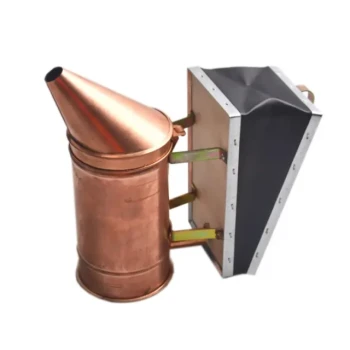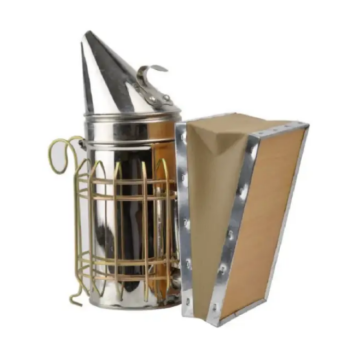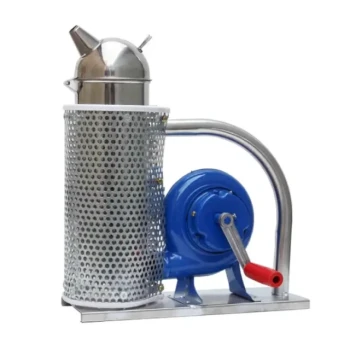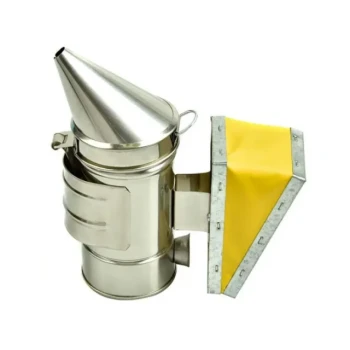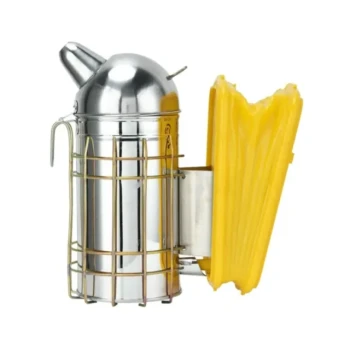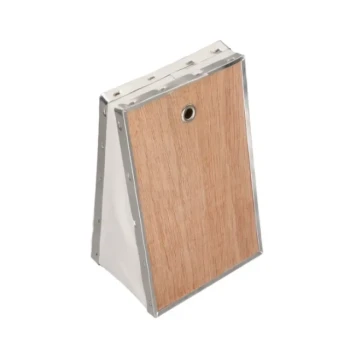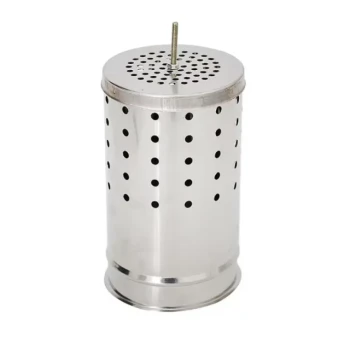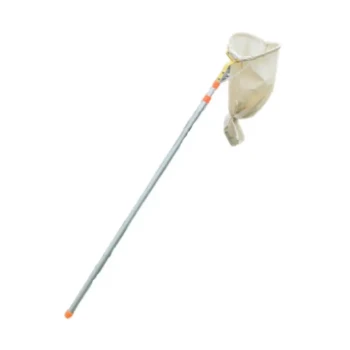At its core, smoke leverages a bee's natural instincts against itself. It works in two primary ways: it masks the chemical signals bees use to communicate danger and simultaneously triggers an instinctual survival response to a potential forest fire, compelling them to prepare for evacuation rather than attack.
The use of smoke is not about sedation but about manipulation. It disrupts the colony's defensive communication network while activating a more urgent, non-aggressive survival protocol focused on consuming resources for a potential escape.
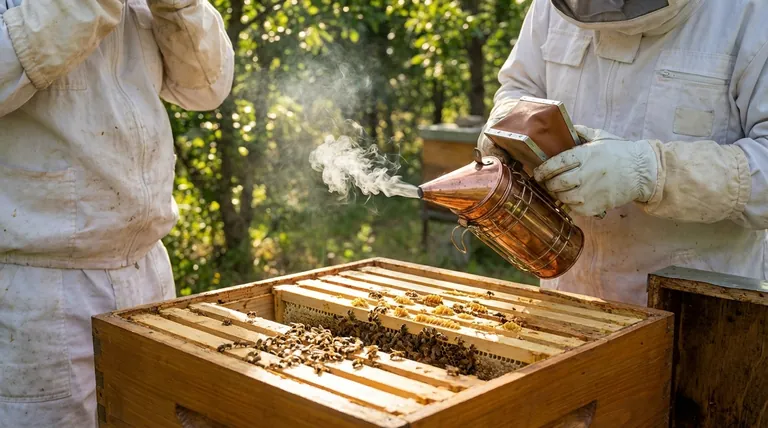
The Two-Fold Effect of Smoke on Bee Behavior
Smoke fundamentally alters a bee colony's priorities, shifting them from defense to self-preservation. This is achieved through a powerful combination of sensory disruption and instinctual triggers.
Mechanism 1: Masking Alarm Pheromones
When a guard bee perceives a threat, it releases alarm pheromones. These chemical signals act as a colony-wide alarm bell, rapidly mobilizing other bees into a defensive, aggressive state.
Smoke particles effectively overwhelm the bees' sensitive antennae. This sensory overload masks the alarm pheromones, preventing the danger signal from spreading throughout the hive.
Without the chemical trigger to attack, the rest of the colony remains largely unaware of the perceived threat, preventing a mass defensive response.
Mechanism 2: Triggering a Feeding Response
Bees associate smoke with a forest fire, a critical threat to their hive. Their evolutionary response is not to fight the fire but to prepare to abandon the hive and establish a new home.
To prepare for this journey, bees fly into the hive and begin to gorge on honey. They instinctively consume as much as possible to store energy for building a new nest.
A bee that is engorged with honey has a full abdomen, which makes it physically difficult to bend its body into the proper position to sting. This, combined with their focus on feeding, makes them significantly less inclined to be aggressive.
Understanding the Practical Consequences
The effects of smoke are not magic; they are a direct result of exploiting bee biology. Understanding these nuances is key to using smoke effectively and responsibly.
Why Do Bees Seem "Calm"?
The perceived calmness is a combination of distraction and miscommunication. The bees are not sedated but are intensely focused on the task of eating honey.
Simultaneously, the lines of communication for defense have been cut. The beekeeper can inspect the hive without triggering the coordinated attack that alarm pheromones would normally incite.
Can Smoke Harm the Bees?
As long as the smoke is cool and used in moderation, it does not directly harm the bees. The primary risk comes from using smoke that is too hot, which can burn their wings and bodies.
However, excessive smoke can be counterproductive. Instead of calming the bees, it can over-stimulate them and cause agitation and panic.
The Impact on Honey Quality
Honeycomb cappings are permeable and can absorb aromas from the air. While moderate smoking is unlikely to affect the final product, excessive use of smoke can taint the honey.
Heavy, prolonged smoking can impart a smoky flavor and aroma to the honey, which is considered a defect. Studies show smoke can alter the volatile chemical characteristics of honey.
How to Apply Smoke Effectively
Correct application is about finesse, not force. The goal is to send a clear signal that disrupts defense without causing undue stress or panic.
- When first approaching the hive: Gently puff smoke at the entrance a few times. Wait a minute or two before opening the hive to allow the effects to take hold.
- When managing a restless colony: Use gentle wafts of smoke to interrupt any emerging alarm cycles if bees start to become agitated during an inspection.
- If you get stung: Immediately smoke the affected area on your suit or skin to mask the alarm pheromones released by the sting, preventing other bees from targeting the same spot.
- To direct bee traffic: A puff of smoke can be used to gently move bees away from a specific area of a frame you need to work on.
Mastering the use of smoke is about communicating with the colony in a language they understand, ensuring inspections are safe for both the beekeeper and the bees.
Summary Table:
| Effect of Smoke | Key Mechanism | Result for the Beekeeper |
|---|---|---|
| Masks Alarm Pheromones | Overwhelms bees' antennae, preventing danger signals | Prevents coordinated defensive attacks |
| Triggers Feeding Response | Mimics a forest fire, prompting bees to gorge on honey | Bees are less aggressive and physically unable to sting easily |
Ready to Elevate Your Beekeeping Practice?
Mastering hive management starts with the right tools and knowledge. At HONESTBEE, we supply commercial apiaries and beekeeping equipment distributors with high-quality, reliable beekeeping supplies through our wholesale-focused operations.
Let us help you ensure every inspection is safe and efficient. Contact our expert team today to discuss your apiary's needs and discover how our equipment can support your success.
Visual Guide
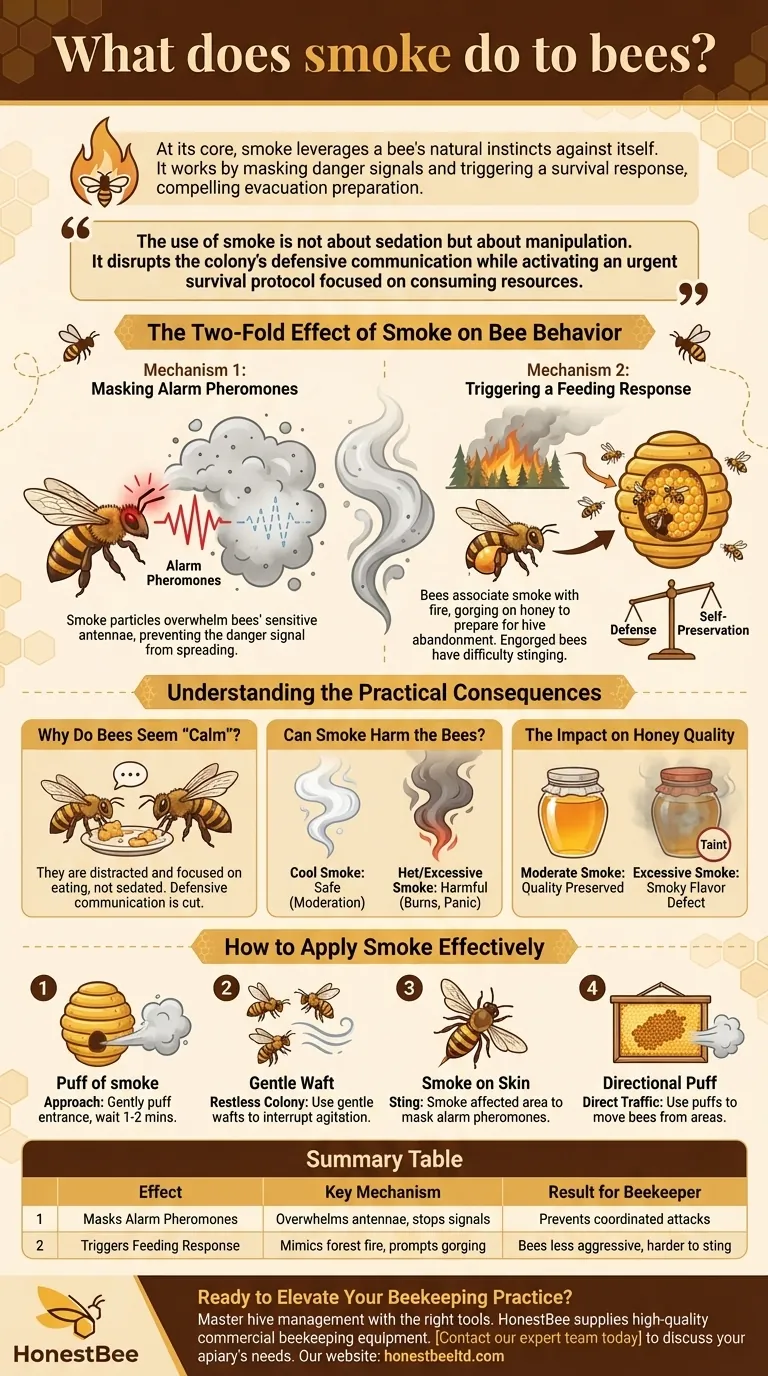
Related Products
- Premium Traditional Copper Bee Smoker with Bellows
- Stainless Steel Honey Bee Smoker Hive and Honeycomb Smoker for Beekeeping
- European Stainless Steel Bee Smoker for Honey Bee Hive
- Electric Bee Smoker European Style Bee Hive Smoker for Beekeeping
- Economy Galvanized Beekeeping Honey Bee Smoker for Wholesale
People Also Ask
- What is the primary role of using smoke in beekeeping? Master Hive Safety and Colony Management
- How does a smoker help keep a bee colony calm? Master Hive Management with Professional Smoke Techniques
- How does the smoke inlet pipe design benefit giant honey bee sedators? Optimize Cooling and Protect Your Colony
- What is the primary function of a specialized bee smoker? Master Hive Control and Operator Safety
- What is the primary objective when lighting a bee smoker for apiary management? Achieve Cool Smoke for Calm Bees
- How long does it take to clean a bee smoker? From 15-Minute Quick Fix to 10-Hour Deep Clean
- What are the benefits of using a bee smoker? Calm Your Colony and Enhance Hive Safety Today
- Can you smoke bees out of a hive? Why This Common Beekeeping Myth is Dangerous
